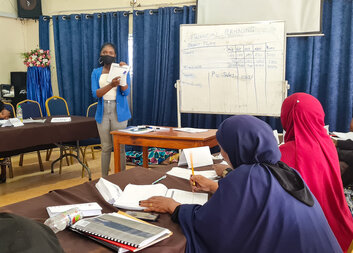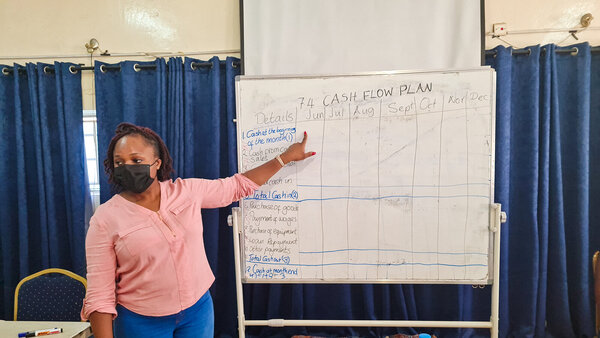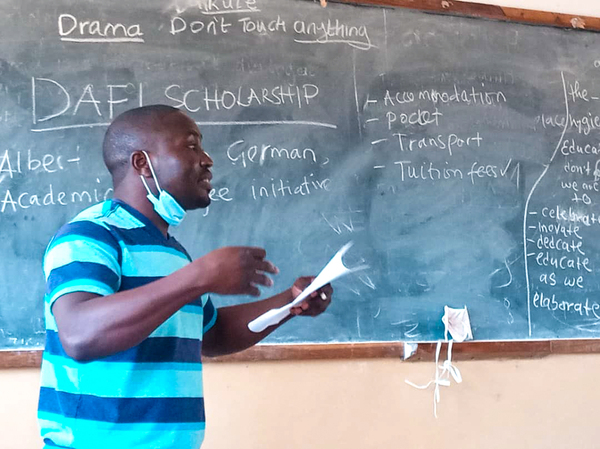Restrictions associated with COVID-19 has made the lives of displaced people even more vulnerable, limiting their access to basic rights. As of 31st August 2020, Zambia has hosted over 92,598 people of concern who have fled their homelands due to persecution, conflict, violence or natural disasters.
For decades, Zambia has been a safe haven and country of transit for refugees from Congo, Burundi, Rwanda, Somalia, Syria, Turkey and other countries. Supported by UNHCR’s innovative programs, Caritas Czech Republic provides emergency relief and development aid focused on support of refugee self-reliance. Caritas Czech Republic in Zambia aims to support the government’s efforts to provide protection and assistance to forcibly displaced and stateless people. These include harmonious co-existence with host communities, access to education, socio-economic and financial inclusion, as well as opportunities to earn a living.
Community Empowerment and Self-Reliance
Since the outbreak of the coronavirus, Caritas Czech Republic has helped vulnerable refugees cope with the economic impact of the pandemic.
“In direct response to the pandemic, we have – in close cooperation with UNHCR Zambia – engaged local tailors to produce more than 65,000 face masks to pupils and others in need. Small businesses affected by Covid restrictions have been supported through access to recovery capital,” says Lucie Hrabcova, Caritas Czech Republic Programme Manager.
Together with our partners, we have continued to empower vulnerable members of both refugee and host communities through complex self-reliance interventions. In 2020, up to 4,000 beneficiaries were targeted directly (16,000 indirectly) with livelihoods support, an increase compared to those supported in 2019.
Across all the hosting locations and the three refugee settlements in Maheba, Mayukwayukwa and Mantapala, refugees and host community members are empowered through support of agriculture and non-agriculture businesses, linkages to aggregators and markets, access to capital and financial inclusion via village banking, cash grants and linkage to financial institutions. Refugees are also being empowered with business skills training and technical capacity building, including vocational skills training.
“I arrived in Zambia with a family friend following the genocide in Rwanda. Most of my immediate relatives had been killed, and my mother had to give me up as she was unable to provide. Once I arrived here, I got married and had to find a way to fend for my family. I would like to learn the financial planning skills needed to open up a mobile money booth,” says Michelin, a refugee from Burundi.
Pictured: Grace Banda, A Caritas Czech Republic Trainer facilitating an Entrepreneurship Skills workshop for vulnerable women and girls in Lusaka
“Financial inclusion can play a critical role in empowering refugee populations, by removing barriers to economic independence they are enabled to meet their needs in a sustainable and dignified manner.” Says Mika Mwambazi, Caritas Czech Republic Public Relations Manager.
Vocational Skills Training
Youth refugees and their Zambian host community population in Mayukwayukwa, Meheba and Mantapala settlements suffer high unemployment. In 2020, we provided complimentary funds for the completion of a technology and design workshop in the Mantapala settlement. The workshop enables facilitation of short-term practical and marketable skills trainings to youths in the settlement. At the same time, we have continued to enable young people from both refugee and host communities to access vocational training programmes at certified skills training institutions. We have also supported them with entrepreneurship training, case-management and start-up capital. In 2020 alone, the Vocational and Entrepreneurship Training Sponsorship Program (VETSP) was completed by 75 youths. 280 more youths will be supported through this programme in 2021.
Young refugee students can pursue higher education
Zambia has a long history of providing international protection and assistance to refugees. However, as a developing economy, the country faces major challenges in meeting the demand for social services. Most of the refugee hosting communities are in highly deprived geographical locations, with limited access to education, health services and livelihoods opportunities.
The increasing cost of tertiary education remains a serious challenge for refugees who are not eligible for bursaries or any student loans. The UNHCR’s Refugee Scholarships Programme (DAFI), is a pathway that enables gifted young refugee students to pursue higher education. In its 28-year history, the DAFI Scholarship program has sponsored more than 18,500 young refugee women and men to pursue their undergraduate degrees across the globe. In Zambia, Caritas Czech Republic is supporting the program with skills development and capacity building activities. Currently, 46 refugees from the 3 refugee settlements and Lusaka target communities are enrolled in tertiary education under DAFI.
Pictured: Credwine Sichone, DAFI Scholarship Sensitization campaign in Mayukwayukwa refugee camp at Mayukwayukwa Secondary school
Promoting “Ubuntu”
The African philosophy of “ubuntu” is centered on the belief in a universal bond of sharing that connects all humanity. In line with this year’s World Refugee Day theme of ‘togetherness’, Caritas aims to change the perception that refugees are a burden to their host communities. In collaboration with the Zambian government and international partners, we will continue to promote the principle of solidarity, through a consorted approach in building awareness of refugee contributions to the communities they live in. Because every person, regardless of racial, national, ethnic or religious affiliation, has the right to a dignified life regardless of where they choose to live.







